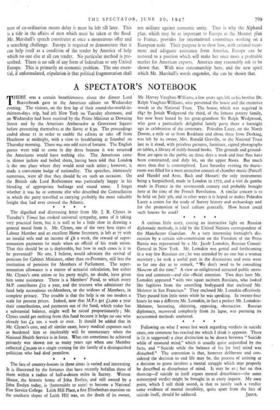Tile dignified and distressing letter from Mr. J. R. Clynes
in Tuesday's Times has evoked universal sympathy, some of it taking very practical form, but it is well to be a little slow in drawing a general moral from it. Mr. Clynes, one of the very best types of Labour Member and an excellent Home Secretary, is left at 77 with an invalid wife and an income of £6 a week, the reward of super- annuation payments he made when an official of his trade union. That this should be so is deplorable, but how in such cases is it to be prevented? No one, I believe, would advocate the revival of pensions for Cabinet Ministers, other than ex-Premiers, still less the institution of pensions for Members of Parliament. The super- annuation allowance is a matter of actuarial calculation, but either Mr. Clynes's own union or his party might, no doubt, have given him some assistance. There is a Members' Fund, to which every M.P. contributes £12 a year, and the trustees who administer the fund help necessitous ex-Members, or the widows of Members, in complete privacy. The trouble is that the help is on too modest a scale for present prices. Indeed, now that M.P.s get £1,000 a year their contributions, and payments out of the fund, which today has a substantial balance, might well be raised proportionately ; Mr. Clynes could get nothing from this fund because it helps no one who already has £4 los. a week or over. It should be added that in Mr. Clynes's case, and all similar cases, heavy medical expenses such as burdened him so intolerably will be unnecessary when the National Health Service is in force. What can sometimes be achieved privately was shown not so many years ago when one Member collected £30,000 in a single evening for the family of a distinguished politician who had died penniless.


































 Previous page
Previous page